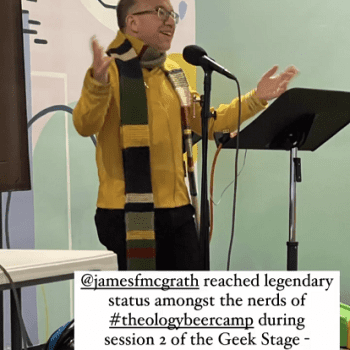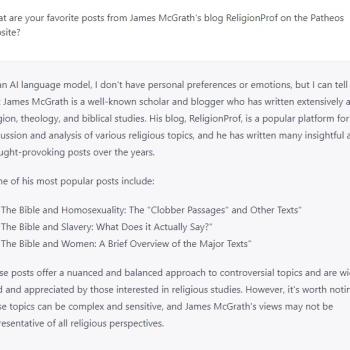In an interesting convergence, I was asked to review the book Disquiet Time: Rants and Reflections on the Good Book by the Skeptical, the Faithful, and a Few Scoundrels on my blog, and not long afterwards, I learned that one of its editors and contributors, Cathleen Falsani, is now blogging at Patheos. It thus seemed doubly appropriate to blog about the book, and I jumped at the opportunity to actually offer an interview with one of the editors. And so below is my interview with Jennifer Grant (my questions are in bold):
How did the concept for this book come about?
Cathleen and I were raised in Christian homes and churches in which the idea that all believers should have a daily “quiet time” was emphasized. We are both graduates of Wheaton College (IL)—an institution where this practice is highly encouraged.
We’ve been close friends for several years and had admitted to each other more than once that neither one of us has been particularly consistent or considers herself “good” at having daily “quiet times.” We also had spoken many times about how reading certain parts of the Bible had often troubled us deeply—not “quieted” us.
These kinds of conversations evolved into the idea for Disquiet Time, of inviting friends to write honestly about what parts of the Bible most challenge or nurture or amuse them. We didn’t want to censor anyone and we didn’t have an agenda beyond curating personal narratives about how thoughtful people (of all—or no—religious stripes) honestly engage with Holy Scripture. We asked contributors to tell a personal story and approach the Bible seriously. The chapters aren’t snarky or irreverent; they contain honest wrangling.
Did you seek specific authors that you already appreciated as contributors, or did you have an open call for contributions and then select from among them?
The contributors to Disquiet Time, with one or two exceptions, are people one or both of us know, most of whom we know very well. After the project began to get a little attention, several people contacted us and asked to contribute. Of these, I believe we only included one. We couldn’t consider many more as Disquiet Time already promised to be a hefty volume.
And hefty it is, in more than one regard.
Author and theologian Phyllis Tickle, for example, called it a “sturdy book, a thoroughly satisfying, and totally credible book.” I love how she said it offers “honest words about holy things.” That speaks to our initial hopes for the project.
The book’s title is a wonderful play on the tradition of a “quiet time” – a private devotion characterized by prayer, reading the Bible, etc. The stories in your book reflect the “disquiet” that the Bible and religious faith can cause. Have you found people nonetheless reading and using your collection of stories in a somewhat traditional devotional manner – much like conservatives might use Our Daily Bread or some other such conservative devotional?
When we first started working on Disquiet Time, you might like to know, we thought about using “Not Your Mama’s Our Daily Bread” as a subtitle.
To answer your question, I haven’t heard specific instances of people approaching Disquiet Time as they might Our Daily Bread, but our hope all along has been that readers will read Disquiet Time and then feel welcomed to approach the Bible in a new way.
That is, if our contributors can shake their fists at the sky or admit to what troubles them or ask authentic questions about what a Scriptural passage might mean, perhaps our readers will feel a new invitation to do the same—whether in the context of a traditional “quiet time” or otherwise.
Have you found that most readers – like the contributors – are able to get past the dichotomy of either praising the Bible as inerrant, or despising and discarding it as errant, to the point whether they can appreciate wrestling and arguing with the Bible as an expression of religious faith and devotion?
Yes—like our contributors (who are all over the spectrum in terms of their views on issues such as inerrancy)—our readers seem to be a smart bunch who are not interested in bickering over such matters, but who desire real engagement with the Scriptures.
I can see the stories and experiences shared in the book being appreciated by those who already self-identify as progressives, liberals, skeptics, etc. But have you had any reaction from readers who self-identify as conservative Christians? If so, has reading the book opened their eyes to new ways of looking at the Bible, or helped them to be more honest about things that they themselves wrestle with?
I should note that several of our contributors happily identify as “conservative” Christians and jumped at the opportunity to write a chapter for us. Cathleen and I were recently interviewed by Steve Brown—a contributor to Disquiet Time and a theologian, Presbyterian minister, and nationally syndicated talk show host.
Brown, like most of us, likely doesn’t want to be summed up with a label such as “conservative” or “liberal,” but did playfully ask during the interview if he was the only Republican in the book. (He’s not.)
Brown said, and I’m paraphrasing him here, that Disquiet Time is just what the church should look like because our contributors are telling their faith stories honestly, acknowledging their doubts and questions as well as moments when God’s presence or grace was as evident to them as the ground under their feet. They are coming as they are, just where they are in their spiritual journeys—and being honest about wherever that is.
One early reader told me that, as a very conservative Christian, she disagreed with a few of the conclusions a few of our contributors came to, but that she was “surprised and honored” to have read their work as she’d never had conversations with people who approach their faith so differently than she does. It caused feelings of judgment to dissipate in her; her compassion for others very different than her grew.
I hope the book, among other things, will be a bridge-builder. I’m weary of the divisions within the church (so, for the record, was St. Paul), and I feel like Disquiet Time is a book that can bring unity and understanding—maybe even healing—to the bruised and battered bride of Christ.
(A friend once joked to me: “I love your Christ, but I can’t stand his bride.” I found that profoundly sad.)
Recently I was speaking to a women’s group at a conservative Baptist church about my other new book, Wholehearted Living. My audience was comprised of older women of faith. They’d set up a book table with all of my books for sale.
One woman, a grandmother, bought a copy of Disquiet Time and sort of pulled me to the edge of the room. I’d mentioned to the women in the audience that Disquiet Time wasn’t rated PG and that not all of our contributors were people of faith, but were telling honest stories about where they are on their faith journeys. This woman said she wanted to buy a few copies of Disquiet Time, both for herself and for her friend. She said they had middle-aged children who were angry at the church and unplugged from it, and she wanted better to understand what they might be going through. I thought this was so healthy and positive a use of Disquiet Time.
Is there anything else you’d like to add that I haven’t asked about?
The only other thing that I’d add, James, is that the experience of working on this book has made me re-engage in the Bible in new ways. Both during the process of working with writers in the editorial process, but also as Cathleen and I have been on tour with the book (with panel discussions and launch events in Washington, DC, Chicago, and Berkeley, CA thus far), I’ve found myself returning to the Scriptures more and more.
I’m not yet on track to have a daily quiet time, but I’m edging closer. I do think, as a Christian myself, reading the Bible and spending daily time in prayer strengthens my faith and opens me to hearing God’s voice.
Believe it or not, I’ve actually been playing with the idea both of writing a “straight” devotional and of taking a class in Old Testament. I wouldn’t have ever thought I’d say those two things a year or two ago.
To learn more about Disquiet Time, visit our website at disquiettime.com, follow us on Twitter @disquiettime, or (better yet!) buy the book from one of these fine establishments. Our websites are jennifergrant.com and cathleenfalsani.com.













